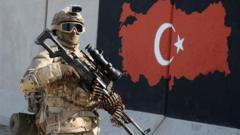Pope Francis, the esteemed leader of the Catholic Church, died today at the age of 88 after suffering a stroke that precipitated further health complications.
Pope Francis Passes Away at 88 Following Health Complications

Pope Francis Passes Away at 88 Following Health Complications
The Vatican confirms the death of Pope Francis due to a stroke, triggering global mourning and reflections on his legacy.
April 21, 2025, 6:00 p.m. ET
The Vatican announced today the death of Pope Francis, aged 88, as a result of a stroke that led to a coma and ultimate cardiovascular collapse. Health experts highlighted that Francis had been grappling with serious health issues, including Type 2 diabetes and high blood pressure, both of which contribute significantly to stroke risk. Moreover, the pope suffered from bronchiectasis, a chronic lung condition that can make patients particularly vulnerable to infections and subsequent complications.
The stroke, a critical condition resulting from disrupted blood supply to the brain, was likely exacerbated by Francis’s previous hospitalization for pneumonia. Medical professionals, including Dr. Burton Dickey, a pulmonary expert, elaborated on how infections in patients with bronchiectasis could trigger severe health declines, further complicating conditions like pneumonia that could lead to clots and ultimately a stroke.
Following the stroke, the Vatican reported that Pope Francis experienced "cardiocirculatory collapse," a term that describes when the heart and lungs can no longer maintain proper function, marking the final stage of life progression. Dr. Michelle Kittleson, a cardiology professor, noted that strokes can often influence areas of the brain that manage heart activity, leading to cascading failures within the body's systems.
As the world mourns the loss of Pope Francis, reflections on his papacy and profound impact on the church and society continue.
Nina Agrawal is a Times health reporter.
The Vatican announced today the death of Pope Francis, aged 88, as a result of a stroke that led to a coma and ultimate cardiovascular collapse. Health experts highlighted that Francis had been grappling with serious health issues, including Type 2 diabetes and high blood pressure, both of which contribute significantly to stroke risk. Moreover, the pope suffered from bronchiectasis, a chronic lung condition that can make patients particularly vulnerable to infections and subsequent complications.
The stroke, a critical condition resulting from disrupted blood supply to the brain, was likely exacerbated by Francis’s previous hospitalization for pneumonia. Medical professionals, including Dr. Burton Dickey, a pulmonary expert, elaborated on how infections in patients with bronchiectasis could trigger severe health declines, further complicating conditions like pneumonia that could lead to clots and ultimately a stroke.
Following the stroke, the Vatican reported that Pope Francis experienced "cardiocirculatory collapse," a term that describes when the heart and lungs can no longer maintain proper function, marking the final stage of life progression. Dr. Michelle Kittleson, a cardiology professor, noted that strokes can often influence areas of the brain that manage heart activity, leading to cascading failures within the body's systems.
As the world mourns the loss of Pope Francis, reflections on his papacy and profound impact on the church and society continue.
Nina Agrawal is a Times health reporter.




















